 Some of you might still remember my review of Legends of Anglerre which I posted a while ago. While reading this book I thought it would be a blast to do an interview with its lead writer and editor Sarah Newton. Luckily Sarah agreed to answer a couple of question for us.
Some of you might still remember my review of Legends of Anglerre which I posted a while ago. While reading this book I thought it would be a blast to do an interview with its lead writer and editor Sarah Newton. Luckily Sarah agreed to answer a couple of question for us.
Stargazer: Thanks for taking your time to answer a few questions for our blog, Stargazer’s World. Let’s start with a couple of questions about you. Can you please tell our readers who you you are? I especially would like to know what your first roleplaying game was and how you came to work in the RPG industry.
Sarah: My name’s Sarah Newton, and I work for Cubicle 7 as head of their editorial team and line developer and house writer on the Starblazer Adventures, Legends of Anglerre, Cthulhu Britannica, and World War Cthulhu lines. I’m also responsible for their translated games, including Qin and the upcoming Yggdrasil. I’ve been gaming for (cough cough) over thirty years, and am absolutely passionate about the hobby. I began with Tunnels and Trolls back in 1980 – the old pink "Buffalo Castle" was the very first RPG product I ever bought, even before the rules, and I ended up having to make my own rules to play it! After that I got into Traveller, RuneQuest, Dungeons and Dragons (White Box then AD&D), and then pretty much all major RPGs right up to the present day, with the exception of White Wolf, which for some reason I kind of missed – I’ve only recently discovered Exalted, though I like it a lot.
I got working on RPGs through a curious quirk of fate. Back in 2008 Jason Durall was producing his bumper "Basic Roleplaying" rulesbook for Chaosium, and, as a lifelong d100 / BRP fan, I’d pre-ordered a copy. It came through prior to proofing; in a previous life, I used to write functional specifications for web development, so proofing is something I do instinctively, and I asked Jason if he’d like me to send him some proofs. He said yes, and introduced me to Charlie and Dustin at Chaosium, who expressed an interest in my "Chronicles of Future Earth" setting. That was my first ever RPG commission – although it was only published last January! After that I got into the FATE system and met Chris Birch, who’d just written Starblazer Adventures, and wrote Mindjammer and did the lead on Legends of Anglerre, which was where I started working for Cubicle 7.
Stargazer: Who are the RPG designers and SF writers that inspired you the most?
Sarah: I think I’d have to say Greg Stafford for RPG designer: the world of Glorantha and particularly its cosmology have been a constant inspiration since I "discovered" RuneQuest back in 1981. His inclusion of concepts from Joseph Campbell in roleplaying is a stroke of genius, and exactly fits the sort of things I’m looking for in a game: the quest of a hero for transcendence and transformation, and of course rollicking good adventure on the way!
For SF writers, there are two: Cordwainer Smith and Olaf Stapledon, the latter particularly for his book "Starmaker". Smith has again a mythopoetic approach to his SF; he’s by no means a hard SF writer, but instead groks that the genre is about wonder, speculation, and the possibilities for human beings to transcend their limitations towards something far greater. Olaf Stapledon is simply breathtaking in his vision: considering he was writing in the 1930s, his ideas are only now being discussed seriously in the scientific mainstream. That’s an amazing power of vision.
For modern SF writers, I love Stephen Baxter and Peter Hamilton, and of course Ian Banks. I’ve also recently got into Gareth L Powell, particularly his novel "The Recollection", which is beautifully written space opera, and absolutely great stuff.
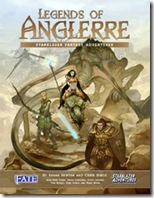 Stargazer: Most people probably know you because you have been one of the authors of Legends of Anglerre, the FATE-based fantasy roleplaying game by Cubicle 7. Can you tell us how you got involved in that project? And can you please share some insight on the development process. What was your goal when working on that game?
Stargazer: Most people probably know you because you have been one of the authors of Legends of Anglerre, the FATE-based fantasy roleplaying game by Cubicle 7. Can you tell us how you got involved in that project? And can you please share some insight on the development process. What was your goal when working on that game?
Sarah: I had the great privilege to work as lead writer and editor on Legends of Anglerre, thanks to the awesome support of Chris Birch and Dom and Angus from Cubicle 7. I’d just finished working on the Mindjammer setting book for Starblazer Adventures, and Chris invited me aboard to work on what we were calling "Starblazer Fantasy Adventures". I jumped at the chance – it’s a rare opportunity to be involved in building a complete fantasy roleplaying game from the ground up!
There were five of us closely involved in the development of Legends of Anglerre: me, Chris Birch, Mike Olson, Tom Miskey, and Marc Reyes, as well as writers such as Mike Chinn (the original writer of the Anglerre stories on the Starblazer comics) and David Donachie, who’s an Anglerre expert and a great cartographer – look for his work in the upcoming Legends of Anglerre Companion! We used to "meet up" for Skype conference calls once every week or so; we divided the necessary tasks between us, and I acted as project manager assembling the various contributions into a single manuscript. We also had a truly great playtest and peer review team on the Cubicle 7 forums, who bashed the rules around and helped us bug-check all through the process – I can’t thank all those guys enough, their contribution was invaluable.
My own goal with Legends of Anglerre was shared with Chris Birch: we wanted the game to really be the fantasy version of Starblazer. Completely compatible, for those cross-genre "fantasy spaceships" mashups, but also an absolutely complete game in one volume, with no need for endless splat books. We were also under clear instructions from both gamers and Cubicle 7 management *not* to write another 650-page monster! We condensed and edited and brought the entire thing in under 400 pages – still easily enough to kill someone with a single blow, but light enough to lift with one arm!
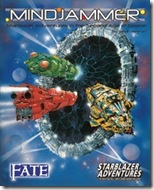 The thing is, although the Legends of Anglerre rules are simple and short – believe it or not, the entire rules are about 20 pages long, presented in the first and second chapters – we wanted the game to contain everything you’d need to run a full fantasy campaign in pretty much any genre. There’s plenty of scope for introducing your own flexibility – inventing your own spells, stunts, creatures, whatever – but if you *don’t* want to do that, there’s also plenty of pre-generated powers to use. There are rules for ships, sieges, running kingdoms (and staging fights between kingdoms!), guilds, empires, magic schools, and so on; there are rules for mass combat, high-powered and even godlike characters, other planes, extremely powerful creatures, creating magic items, the whole range of things you’d expect from a complete fantasy RPG – all in one book!
The thing is, although the Legends of Anglerre rules are simple and short – believe it or not, the entire rules are about 20 pages long, presented in the first and second chapters – we wanted the game to contain everything you’d need to run a full fantasy campaign in pretty much any genre. There’s plenty of scope for introducing your own flexibility – inventing your own spells, stunts, creatures, whatever – but if you *don’t* want to do that, there’s also plenty of pre-generated powers to use. There are rules for ships, sieges, running kingdoms (and staging fights between kingdoms!), guilds, empires, magic schools, and so on; there are rules for mass combat, high-powered and even godlike characters, other planes, extremely powerful creatures, creating magic items, the whole range of things you’d expect from a complete fantasy RPG – all in one book!
Stargazer: What part of Legends of Anglerre is your favorite? And was there something particularly complicated to implement using the FATE system?
Sarah: I love the powers system. We derived that from the psionics and special abilities rules in Starblazer Adventures, re-structuring them to be more logical and systematized, whilst retaining an incredible degree of freedom for spellcasters and the like. We were really keen to make sure the powers were flexible enough to work as magical spells, divine powers, monstrous creature abilities, however you want to describe them, and also to take advantage of the incredibly free-form feature set of the core Starblazer / Legends of Anglerre skill system. Starblazer Adventures, for example, lets you use a mundane skill (let’s say a weapon skill) to attack, defend, block, and perform manoeuvres; it allows a player to get truly creative with what he does with a skill, within the framework of the rules. We took that freedom, and plugged it into the powers system; now, for example, a spellcaster can use his Fire power skill to attack, defend, block other attacks, resist fire, and even create impressive fire-based manoeuvres, and then create stunts to do the really extra-cool high power stuff. We then took that into the epic and mythic space with the high-power rules, too.
I’m also very proud of the advancement system. FATE previously didn’t really have a well-defined advancement system, but a fantasy RPG needs one as a basic requirement – everyone wants to see their characters get more powerful and cool as they play. We worked very hard to make sure the advancement system wasn’t simply an "experience point" system, but was built into all aspects of the game – so you can use it not just to improve your own abilities, but to advance your own guild, warband, or even kingdom, or explore the powers of a magical item, or increase your prestige in your community. You can even become a god!
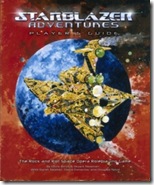 Stargazer: As far as I know you’ll be also working on the 2nd Edition of Starblazer Adventures. Can you please share with us what will be new in this upcoming edition. Will it be necessary for owners of the first edition to upgrade or are there are mostly minor changes?
Stargazer: As far as I know you’ll be also working on the 2nd Edition of Starblazer Adventures. Can you please share with us what will be new in this upcoming edition. Will it be necessary for owners of the first edition to upgrade or are there are mostly minor changes?
Sarah: First: you don’t need to upgrade, but we hope you’ll want to. Starblazer Adventures 2nd edition is exactly that: it’s a new *edition* – it’s been re-edited. That means it’s been re-structured, some of the wording has been changed, there are clearer (and more) examples, and the typos and bugs of the 1st edition have been fixed. We’ve also taken the opportunity to include some of the new rules from Legends of Anglerre, such as future aspects, group characters, and the Fog of War mass combat rules. Structurally, the game is now in two books: a Player’s Guide and a Story Teller’s Guide, each approximately the same size. We had a lot of feedback on Starblazer 1st edition that the rulesbook was simply too big, and that players wanted something more portable they could read and use in play and for character creation. We’ve taken that on board, and the Player’s Guide contains everything players will need for the game, up to and including the core system rules.
We’ve also tweaked the equipment rules, the layout look n feel, character sheet, vehicles rules, and also included the trading rules I’d worked up for Mindjammer Adventures. We hope people will be keen to upgrade – although the 1st edition rules remain completely usable!
Stargazer: It occurred to me that a lot of FATE games like the aforementioned Starblazer Adventures, Diaspora and Bulldogs! are actually SF or Space Opera games. Do you think there’s a particular reason why FATE is used or is it just a sign of the popularity of the game system?
Sarah: I’m personally surprised FATE isn’t used more widely in all genres, although it does lend itself very well to a pulpy, action-packed style of play. In my own humble opinion, I think science-fiction roleplaying has been a bit dogged by a very serious, hard scifi approach, which is great for certain genres of roleplaying, but not particularly for action-packed space opera. To be completely honest, I don’t think there *was* a fully-featured, action-packed, cinematic space opera RPG system before Starblazer Adventures – I’ve been GMing science-fiction RPGs since the very beginning, and Starblazer is the first to feel properly space opera and let you play through the classic space opera tropes. Again, that’s all IMHO, of course! 🙂
Whilst I’ve not read Diaspora, I do own and love Bulldogs! – it’s a great game with a cool and very specific setting, with an awesome Starship Troopers feel. I love what Brennan and his team have done with the game, and wish them huge success. I think there’s loads of room for FATE love in the RPG community – it’s only been 5 years since Fred, Rob, and Lenny invented the FATE 3 system, and it’s certainly changed my RPG life. It was awesome seeing them sweep the board at the ENnies this year – congrats again, guys!
Stargazer: Apropos FATE and SF: You are the author of the Mindjammer setting for SBA and an upcoming novel of the same name. Can you tell us a bit about both? And can you give us some updates on the progress on the second edition of Mindjammer?
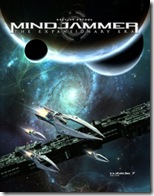 Sarah: Mindjammer is my attempt to write my perfect science-fiction setting. We’re now in the second decade of the 21st century, and the nature of science-fiction has gone through massive changes since the invention of SF roleplaying in the 1970s. We’ve been through 80s space opera, right through cyberpunk and beyond, and even surpassed the transhuman and singularity movements, to the extent that "transhuman science-fiction" is almost a tautology – pretty much *all* modern science-fiction is transhuman in one way or another!
Sarah: Mindjammer is my attempt to write my perfect science-fiction setting. We’re now in the second decade of the 21st century, and the nature of science-fiction has gone through massive changes since the invention of SF roleplaying in the 1970s. We’ve been through 80s space opera, right through cyberpunk and beyond, and even surpassed the transhuman and singularity movements, to the extent that "transhuman science-fiction" is almost a tautology – pretty much *all* modern science-fiction is transhuman in one way or another!
I think science-fiction roleplaying should reflect that, whilst retaining its awesome, maximum game fun, action-packed feel. Mindjammer attempts to do that, by introducing transhuman themes such as longevity, augmentation, technological psionics, sentient starships, memory uploads (and downloads), and much more as the basic assumptions of the setting. Since winning the ENnie Judges Spotlight Award in 2010, we’ve been working on the Mindjammer 2nd edition, with heaps of new content and all new artwork by the enormously talented Paul Bourne. It should be out towards the end of this year, and followed by numerous other supplements.
The Mindjammer novel is Cubicle 7’s first foray into fiction to support its RPG lines, and is a 400-odd page action-packed novel of transhuman adventure, set right in the New Commonality of Humankind. If you know the Mindjammer supplement, you’ll already know some of the main characters. I’m personally very excited about the Mindjammer novel – it’s not only a cracking story of far future space opera, cinematic and geared up to gamer expectations, it’s also proper science-fiction in its own right, dealing with some of the implications of the hyper-advanced technologies which the Commonality has. The story deals with a team of troubleshooters working for SCI Force – the Security and Cultural Integrity Instrumentality – working with a culture which is being "Rediscovered" by the Commonality, and which isn’t dealing with the culture shock very well. What they discover – well, I won’t give any more away than to say it could threaten the Commonality itself! You can read more in the novel itself, available online and in good hobby stores everywhere from mid-October; check out www.mindjammer.com for more!
Stargazer: While doing some research for this interview I noticed that you have written “The Chronicles of Future Earth” for Basic Roleplaying. I actually bought a copy of that book mainly because I was intrigued by the setting. Alas I was a bit disappointed that the scope of the setting was quite limited. Do you think there will be more material for the Future Earth in the future?
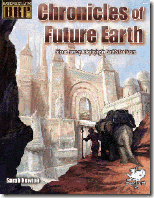 Sarah: Definitely yes! The Chronicles of Future Earth was my first ever RPG book, and originally was pitched to be five times as long – well over 200-300 pages! Chaosium obviously didn’t know me as a writer at all, so were quite naturally cautious, and preferred the first book to be more modestly sized, which is the book you see today. They’ve asked me to write a player’s guide for the Venerable Autocracy, which I’m in the process of doing, and hopefully that will hit the shelves during 2012. I also have material for a trilogy of campaign scenarios and several supplements, so there’s plenty more if people want to see it. Everyone has said very kind things about Chronicles, and at the same time said they wanted more, so hopefully we’ll be able to oblige!
Sarah: Definitely yes! The Chronicles of Future Earth was my first ever RPG book, and originally was pitched to be five times as long – well over 200-300 pages! Chaosium obviously didn’t know me as a writer at all, so were quite naturally cautious, and preferred the first book to be more modestly sized, which is the book you see today. They’ve asked me to write a player’s guide for the Venerable Autocracy, which I’m in the process of doing, and hopefully that will hit the shelves during 2012. I also have material for a trilogy of campaign scenarios and several supplements, so there’s plenty more if people want to see it. Everyone has said very kind things about Chronicles, and at the same time said they wanted more, so hopefully we’ll be able to oblige!
Stargazer: Is there anything else you’re currently working on? What else would you like to share with our readers that I forgot to ask you?
Sarah: Most of all, I’d like to say thanks to gamers everywhere for keeping our hobby going. It’s thanks to everyone’s passion, enthusiasm, support and dedication that people like me are able to produce games, and it’s a great honour and a privilege. Sites like Stargazer’s World play a crucial role in this, and great thanks and kudos to you, Michael, for your dedication in keeping it going. It’s a great hobby to be a part of!
For me, the next year or three are looking busy, with lots of material coming out for Starblazer and Mindjammer, Legends of Anglerre, Chronicles, and Cubicle 7’s upcoming Call of Cthulhu sourcebook "World War Cthulhu". For Starblazer, we have the long-awaited Planet Killers, and a very exciting new setting which we’ll be announcing in the new year; for Mindjammer, we have the second edition "Mindjammer – The Expansionary Era", Mindjammer Adventures, Planeships and Slowboats, a Commonality atlas, and PDF scenarios; for Legends of Anglerre, the upcoming Companion, plus a trilogy of scenarios, and an exciting historical fantasy setting sourcebook. I’m also working on two more Mindjammer novels, and some other fiction projects which have to remain under wraps for now. It’s a hugely exciting time to be working in the industry!
Thanks again for the opportunity to be interviewed, Michael, and best wishes to yourself and everybody reading Stargazer’s World. Happy gaming!
Stargazer: Thank you for taking your time answering our questions. Good luck with the Mindjammer novel and all your other current and upcoming projects! Take care!
By the way, you can follow Sarah Newton online at her website sarahnewtonwriter.com, on Facebook, and on Twitter.

1 Response
[…] familiar with Cubicle 7 and the wonderful products they’re producing. So I was excited to see an interview from Stargazer with Sarah Newton, Cubicle 7′s lead writer and editor on multiple …. More info from behind the […]